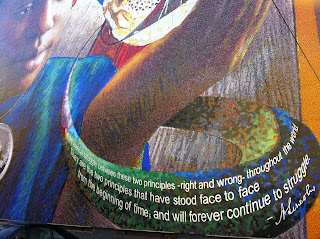#Educon, SLA, and Letting Freedom Ring
Two weeks ago, I had the privilege of attending EduCon, an innovative flavor for a conference, sponsored by Philadelphia’s Science Leadership Academy. In my now-traditional style of good-things-come-to-those-that-wait, I purposely delayed until now the publication of this reflection on the weekend’s events, in order to afford myself time to ruminate deeply upon the changes that were made in me and to my way of thinking.
EduCon, for me, was a liberating experience. From the informal manner of dress and attitude to the conversation-style format of sessions, I enjoyed the freedom that the conference both encouraged and embraced. Perhaps there were times when I took advantage too liberally of that freedom, as I particularly relished leaving one session to pop in on another, partaking of those ideas that best suited my interests. As most progressive (and often techno-centric) learning environments seem to encourage these days, this conference and the bulk of its participants championed student-centered learning almost entirely throughout.
SLA, itself, is a fascinating place, completely barren of desks organized in rows. Laptops for every student in an urban, chartered high school, led by one of the most capable Principals in the country and taught by a hand-picked cadre of extremely talented teachers. Located in downtown in a three-story building, I thought the environment itself was clean enough.
Being my first time in Philadelphia, I was also impressed with its history and culture. Independence Hall, the National Constitution Center, and Liberty Bell were all sites I will never forget, although now I might sympathize with any seeing fit to accuse Philadelphians of some unhealthy relationship with bells and Ben Franklin. Other than while touring D.C., I’d never felt closer to our nation’s Founding Fathers, than when walking those streets, ever thankful for freedom.
In the end, nevertheless, it was freedom – or the lack thereof – that EduCon ironically taught me about best. It began with the tour, wherein some of Philadelphia’s brightest teenagers told of how fortunate they were to be attending SLA.
“So how do your parents know if you’re ever skipping class,” I asked, curious about the technology SLA teachers used to communicate with parents.
“Well, if we miss more than a few days, then Mr. Lehmann just calls home; and we might not get to attend here anymore if there continues to be a problem.”
There’s no school like the old school, because there aren’t many attendance problems at SLA; and from all I could tell, there aren’t many other problems, either.
Except space.
Our two bright tour guides then explained how they cheerfully made the cut, and how nervous they were when applications were first submitted. For the first time in my life, I witnessed firsthand the terrifying reality that not all kids can taste of that SLA goodness, while simple economics explains that because some kids can, others simply cannot.
Let freedom ring? Why yes, well, for some.
In these times of competition and best and giving our all just to climb to the top, isn’t education one of the most liberating opportunities on Earth? Why yes, well, for some. Yet for the other 150,000 students currently enrolled in the Philadelphia School District, as well as most of our nations’ other students in public schools, the opportunities for learning aren’t always as utopian, aren’t always as polished, and aren’t always as capably hand-picked.
But it doesn’t have to be that way. No, IT DOES NOT.
With Linda Darling-Hammond, I warn that unless we, the people, return to a far greater commitment to equity for our students, our nation will continue to evolve into a monster unimagined by those who once framed its existence. With liberty and justice for all? Why yes, but only if we, the people, have the courage to look beyond the some to lift every one of the other.
Let freedom ring.










